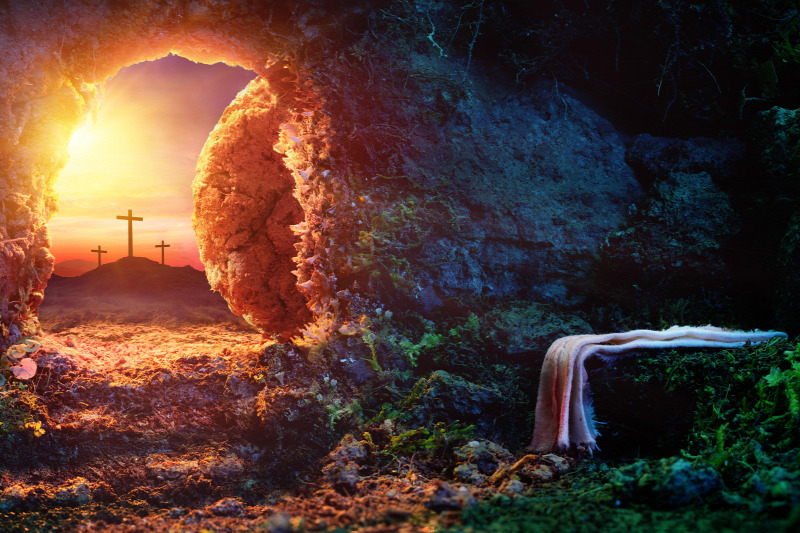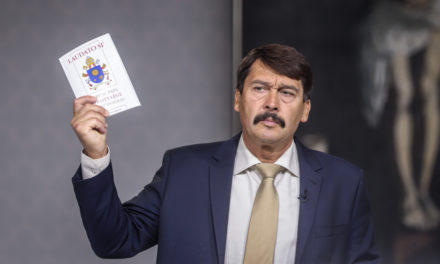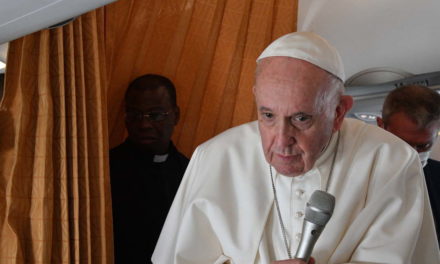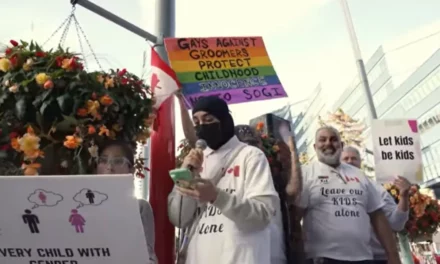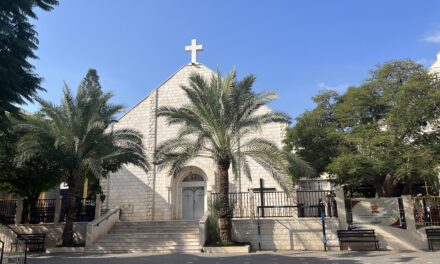"Peace be with you!" – this is how the resurrected Christ greets his disciples. We also sang this in the Easter night liturgy.
But what kind of peace did the resurrection of Christ bring, if there is still war, and in the past two thousand years, mass-murdering wars have destroyed the lives of humanity again and again.
The gentle good news of Christ's resurrection, which unfolds before us from the lines of today's Gospel, shows how the irresistible power of God works in our human history.
Mary Magdalene goes out to Christ's tomb at dawn on Sunday and finds that the stone has been rolled away. He doesn't know what happened, but he feels that something is special. That's why he runs to Simon Péter . Its running is a sign of anticipation, joy, curiosity, but not yet solid certainty. Simon runs to Péter. To that Peter who even denied knowing Jesus in the high priest's garden on Thursday night. Why is he running to her? Perhaps precisely because it could already spread among the disciples, perhaps it was already self-evident that Jesus assigned Peter a special role in the community of his followers. Then - whatever happened - he still has to be told about the Master's grave. After all, the tomb is empty. Human imagination can only think that someone took the body.
Péter and János also run to the grave. Perhaps you already remember that Jesus predicted his resurrection.
Already in his lifetime, Jesus taught his followers that "he who came down from heaven is superior to all" (Jn 3:31) - he applied this to himself. But he is also the one who teaches us how to pray: "Our Father who art in heaven" (Mt 6:9). Heaven is therefore the sphere of God's life, God's existence. What exactly does it mean? Another world, another world? The universe, the cosmos, the world beyond what we can perceive, the way of existence that transcends the dimensions of space and time.
This is God's way of being. Man cannot pass into this form of existence by his own strength, the story of the Tower of Babel showed this beautifully already in the Old Testament (Genesis 11:1-9). No matter how high a tower man built, he could not reach the sky. To this day, we still feel the urge to push the boundaries of what is possible. However, we cannot even think beyond the boundaries of the cosmos, the universe, the material world. Even the concept, even what matter is, we have to define again and again, and even then we always run into the mystery, the question of what was before it or what is beyond it. Heaven often stands instead of God's dwelling, or even God's name.
Instead of the kingdom of God, we sometimes hear about the kingdom of heaven in the Gospel (cf. Mt 3:2), but even today's public discourse sometimes says: "Heaven would give."
The power of God can raise man into the sphere of his own existence.
We also see an example of this in the Old Testament, the story of Elijah's rapture (cf. 2 Kings 2:11). St. Paul talks about how he does not know whether he is in the body or out of the body, but he knows a man who was caught up to the third heaven and had experiences that no eye saw and no ear heard (cf. 2 Cor 12,2-4) . Saint Paul was a great connoisseur of Jewish mysticism, where several spheres were distinguished within the sky. Of course, these were not the layers of the mantle around the Earth, we are not talking about the stratosphere or any other natural phenomenon, but about the different levels of the world of creatures approaching God. It is true that we cannot imagine how there can be a relationship between the Almighty and man, especially how he can embrace us, creatures, how he can raise us to the level of his own existence.
In this, Jesus walks before us, the resurrection of Christ shows that, yes, this is God's intention, this is what he wants to give us, and he calls us to this way of life. But we can only get there if we love Christ, if we cling to him, because then our lives will be inseparable from him. That is why the first Christians understood baptism as being buried in Christ's death in order to be reborn at his resurrection. Our lives also take place in such a force field, let's think about this when we talk about heaven, the kingdom of heaven or heaven.
In this divine richness of existence, there is no more sin, no hatred, no contradiction, but complete and perfect peace is realized. Jesus calls this peace his own peace. He does not give us peace as the world can give us peace. Because the world often calls the victory and firm rule of the stronger one peace, even when injustice, lies, and oppression prevail. Jesus' peace is not like that. He brings a reign of complete justice and love. A peace that is not maintained by violence and lies, but by perfect justice, the order of the almighty and merciful God. It belongs to the immeasurable Lord who can even the death of the innocent with the glory of resurrection in eternal happiness.
But something can shine from this peace already here on earth, if we live in the faith and joy of the resurrected Christ.
If we imitate the love of Jesus and follow his teachings in our lives, if we see his face in the suffering and needy people.
We give thanks to God and thank those who have helped the refugees in Ukraine by offering donations, volunteer work, accommodation, education, and medical care in the past few weeks, and have also testified that the peace of Christ already reigns in their hearts. We ask for this peace for ourselves, our country and the whole world.
Source: Magyar Hírlap/Cardinal Péter Erdő
Featured image: Romolo Tavani

